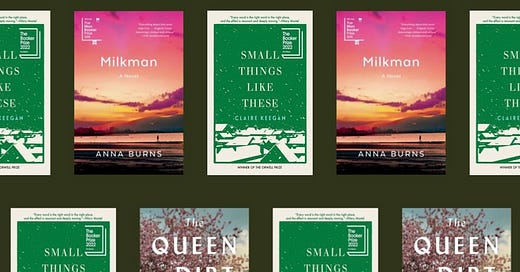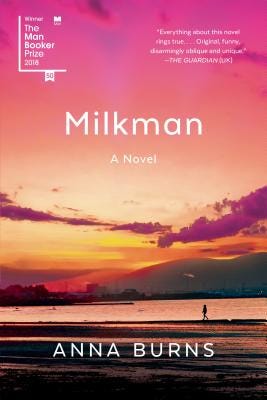Hi friends,
I was out of town this weekend, so my pal Elizabeth Marro kindly agreed to substitute for me. Elizabeth writes Spark, a newsletter she describes as a cross between a book club and a writer’s group. She’s the author of Causalities and is working on her second novel. She’s also the owner of a very adorable dog.
And, now, what to read if …
You Loved “Bad Sisters”
The Queen of Dirt Island by Donal Ryan
Even though I am descended from a long line of Irish women, they scare me – at least the ones in novels or on the screen do. Anyone who has watched Bad Sisters knows what I am talking about. That steely core wrapped in fierce loyalty is not something you’d ever want to be on the wrong side of. They may be middle-class professionals with nice houses and respectable lives, but they would kill for one another, even if it takes a few tries.
If you’re looking to spend time with a few more unforgettable Irish women, you’ll find them in Donal Ryan’s novel The Queen of Dirt Island. The story centers on the three Aylward women, all connected by the same man who dies the very day he brings his wife, Eileen, and newborn daughter, Saoirse, home from the hospital. Eileen, and his mother, Mary, share a house and a fierce love for each other that becomes a kind of fortress against the world, although to their neighbors’ eyes the Aylward women are loud, foul-mouthed, prone to drama, and not entirely respectable if for no other reason than they don’t seem to miss the presence of a man in their lives. Saoirse, through whose eyes the story unfolds, certainly never misses the father she never knew.
These women have each other’s back. When Mary’s remaining son marries and his new wife makes her unwelcome, Eileen builds an addition to her own house for her mother-in-law with her own. When Eileen’s job with a local bookie brings a social worker to the door of their house to check on Saoirse, the older women run her off. When Saoirse herself gives birth as a teenager, “father unknown,” the older women absorb the blow to their dreams for her and the baby becomes yet another precious member of a small band of women who love fiercely and face the world without bowing to it. These women believe there is something special about them and others see it too.
Written in a series of chapters no more than 500 words each, the novel celebrates with its very structure the vastness contained within the confines of a house, a village, a family. Mostly it celebrates the complex, resilient, joyful, sustaining love that women can have for one another when it’s just them against the world.
You Like Fast Reads that Sink Deep
Small Things Like These by Claire Keegan
A man, not a woman, is the protagonist of Claire Keegan’s novella Small Things Like These, but the women shape the events that lead to his fateful decision.
On the surface this story echoes Dickens’ A Christmas Carol. Set in 1985, the novella follows Bill Furlong, as he slowly, step by step, wrestles with a decision that could give meaning to his life but at the expense of his family. A bastard himself, fostered by a Protestant woman who gave him a start in life, he finds a young girl who has been locked in a coal shed as punishment by the influential nuns who run a local Magdalene laundry as well as the best catholic school for girls where he sends his daughters. His sympathy and the understanding that it could have been his own mother there draws him towards action, although he has no idea what to do.
His wife warns him not to concern himself with things, not to “get on the wrong side of people,” especially people with power. A woman he sees daily warns him as well and then “looked at him the way hugely practical women sometimes looked at men, as though they weren’t men at all but foolish boys.”
I held this small book (only 128 pages) in my hands and followed Keegan’s gorgeous prose as she told what appeared to be a brief, simple story that unfolded over a few wintery days in a small Irish community. When I reached the last line, however, I was plunged deep into the heart of the question that propels Bill Furlong forward: what is life for and how to live it?
If you’ve read Small Things Like These, and want more of Keegan’s try Keegan’s Foster and her stories in the collection Antarctica or you can look forward to the film version that is now in the works. Her newest collection, So Late in the Day, is coming next month.
You Watched “Derry Girls” and Are Ready to Get a Little More Serious
Milkman by Anna Burns
To watch Derry Girls, is to get a flavor for what it is like for young Irish Catholic girls to come of age in Derry, Ireland in the 1990s as the “Troubles” creak their way to an end. To read Anna Burns’ Milkman is to slip into the skin of a girl like them twenty years earlier when the end of conflict and violence seemed far away and the need to be careful and considered was just one more constraint among the many that the protagonist must struggle against to be, or become, herself.
The unnamed eighteen-year-old protagonist, “Middle Sister,” is trapped by her sex, by her youth, by her culture, by the religious/political conflict that defines her immediate world, by violence real and implied, and, unwittingly, by herself. It is to feel her own rebellion against the constraints as it is manifested in small ways: reading while walking, concealing her “maybe” boyfriend from a mother who is pressing marriage of any kind to anyone on her, refusing to see herself as others increasingly see her, and refusing to explain herself. When she is targeted and stalked by a member of the resistance on her side of the political/religious conflict, she finds herself isolated not just by the threat of his attentions to her but by the community which has failed to understand her past behavior and, in the absence of her own explanations, supplies their own.
We never know anyone’s real name or even the names of the towns, cities, and the country referred to as “over the water.” Without the names and places, we are absorbed without filter into the thoughts of the protagonist, into her world. We are able to live behind her eyes and view the world she lives in. We are able to see her own mistakes and how she, almost stubbornly, continues to make them as a way of defying what is with what she believes ought to be.
Slender but tough threads of hope, humor, and resilience run through this novel. Middle Sister gives us her world without apology and, often, by making us laugh out loud. Her precocious “wee sisters” act as an impish Greek chorus. Her ferocious, fatalistic, pious mother, at fifty, falls in love and, suddenly aware of her no-longer-young body, communicates her dilemma to her daughter in a page and a half that made me laugh out loud. We understand early on that the narrator is telling us her story from the vantage point of twenty years later and this lends a perspective and underlying wisdom that would not be possible otherwise. There is, in effect, an ending that is, if not exactly happy, then defiant and cautiously joyful.
Burns’ approach to storytelling can be challenging at times but Milkman has everything that is important to me in a novel: a compelling character, a world that throbs with life and conflict, a narrative voice that lives on in my head, What appear to be detours turn out to be small, essential journeys that lead right back into the heart of the book. I loved this novel.
Editor’s note: I had my own “Derry Girls” rec a few years ago.
Thanks to Betsy for filling in. You can find her newsletter here, on Facebook and Instagram.
If you miss my usual pop culture and book ramblings, I wrote a piece for the Chicago Review of Books about the rise of books featuring women wronged in the 2000s (pair it with the Brittney memoir) and another one for Smart Bitches, Trashy Books about Yale’s recent romance conference.
What to Read If is a free weekly book recommendation newsletter. Need a rec? Want to gush about a book? Reply to this email, leave a comment or find me on Twitter @elizabethheld or Instagram.
If you're reading this on Substack or were forwarded this email, and you'd like to subscribe, click the button below.
Disclosure: I am an affiliate of Bookshop.org and I will earn a commission if you click through and make a purchase.









Milkman is spectacular. I recommend the Audiobook by Audible. The narration is superb.
Thanks for the recs - just reserved Small Things Like These and Milkman from the library. And so the TBR gets every bigger and more daunting...